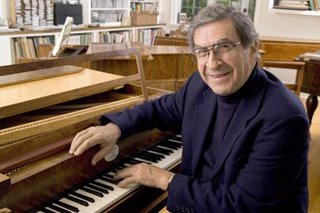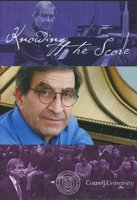
This amazing DVD should be required viewing for all current and former orchestra members.
For current members a copy of the DVD is on reserve in the music library. Please watch the DVD before our masterclass with Malcolm Bilson on December 1 speaking on the Mozart triple concerto.
Here is the info from the
And a
Distributed for the Cornell University Department of Music
In this provocative video presentation, distinguished pianist Malcolm Bilson poses the question, “Do we really know how to read urtext editions, and how can this lead to expressive, even passionate performance?”
In a one-and-a-half hour lecture before a live audience, aspects of notation of Mozart, Beethoven, Chopin, Prokofiev, Schubert, and Bartók are examined, showing clearly that there is far more expressive information in these sources than is usually presumed.
Additionally, in an interview with pianist David Owen Morris in Bilson’s music room, a variety of early pianos are demonstrated and discussed. Two performances by Bilson are also included: Schubert’s Moments Musicaux nos. 2 and 3, performed on an 1830 André Stein piano in the Brahmssaal of the Musikverein in Vienna; and Haydn’s Fantasia in C, on a ca. 1795 Anton Walter replica in the Music Room of at Esterháza in Hungary.
This DVD features a widescreen 16:9 transfer and is recorded in Dolby Digital Stereo. There are French, German, and English subtitles; the DVD has region-free encoding. Approx. 90 minutes.
Reviews
“Malcolm Bilson demonstrates with an infectious enthusiasm that an understanding of and attention to the score can result in increased musical expressivity and excitement, allowing the music to have its full, radical impact.”—Stephen Hough
“By the sheer zest of his commitment to reappraising the way we play and hear the keyboard music of Haydn, Mozart, Beethoven, and Schubert, Bilson has probably done more than anyone else toward shifting the lazy anachronistic clichés to which performers often resort. His passion is an inspiration to us all!”—Sir John Eliot Gardiner
“So you think you know how to read music? Malcolm Bilson’s delightful presentation covers the subtle interconnections and confusions among composers’ intentions, musical notation, intellect, instinct, spontaneity, expression, and meaning in musical performance. It will almost certainly set you to rethinking much of what you thought you knew.”—Neal Zaslaw, Editor, The New Köchel

No comments:
Post a Comment